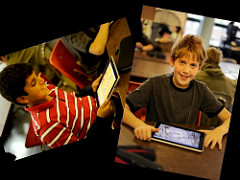Digital Learning: Looking Back and Looking Ahead

As we enter a new calendar year, it is interesting to reflect on the changes we are seeing in regards to the impact of digital resources on the way we learn. One thing I feel strongly about is that as long as we look at digital learning as something extra or separate, we will not be where we need to be. The fact of the matter is that we need to put aside the debates about which technology is the right one for students to access (i.e. tablet vs. Chromebook) and embrace the idea that there are a rapidly expanding number of digital tools that can enhance learning when thoughtfully employed. In fact, knowing which resource to choose and when to utilize it is imperative for those who wish to be considered literate in the years ahead.
The National Council of Teachers of English has a framework which emphasizes that students must "Develop proficiency and fluency with the tools of technology"
Students in the 21st century should have experience with and develop skills around technological tools used in the classroom and the world around them. Through this they will learn about technology and learn through technology. In addition, they must be able to select the most appropriate tools to address particular needs.
Unfortunately, the discussions on education in 2013 has been too focused on which technological devices schools are incorporating into their classrooms and less about how schools are rethinking education and creating more inquiry-based opportunities for students. Hopefully 2014 can focus less on the stuff and more on the substantive changes that are possible when we think about the opportunities that can be afforded all students if we begin to embrace the possibilities for differentiation to meet the needs of all students.
The video short below from Michael Horn, co-founder and Executive Director of Education at the Clayton Christensen Institute for Disruptive Innovation, makes some good points in regards to the past year and what we can expect in 2014. I hope that Horn's predictions that we will see some interesting flex models that push the thinking on how schools use time, as well as, a bigger focus on competency-based learning instead of seat time ring true.
cross-posted at www.patrickmlarkin.com
Patrick Larkin is the Assistant Superintendent for Learning of Burlington Public Schools in Burlington, MA and the former principal of Burlington High. He blogs about education at www.patrickmlarkin.com.
Tools and ideas to transform education. Sign up below.
